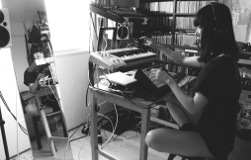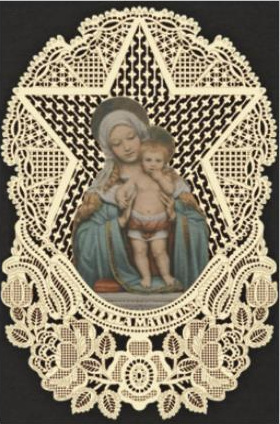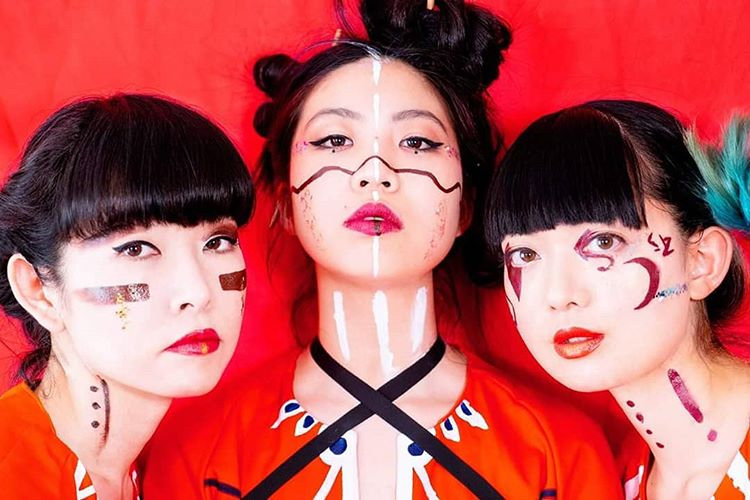 Yuko Araki is not only practised on many instruments but also experienced in many styles of music. In recent years, the Tokyo-based artist has brought to life several groups whose music ranges from acid house to doom and black metal-inspired neoclassicism to imaginary ritual folk music – a musical range to which she contributes singing, percussion, piano, miscellaneous electronics and a lot more. On her solo project, she surprises with a gruff and sober noise, which can be traced back to the tradition of compatriots such as C.C.C.C. or Government Alpha, but with two qualities that also draw from all of her previous work: a freely unleashed energy that mingles with well thought-out complexity. After a debut EP on the Indonesian Gerpfast Raw Tape Division label (and some sampler contributions like the great “Uchronia” compilation), the sequel is now soon available as a beautifully designed tape via Italian label Commando Vanessa. I dare to predict that you will hear and read of her more often in the future.
Yuko Araki is not only practised on many instruments but also experienced in many styles of music. In recent years, the Tokyo-based artist has brought to life several groups whose music ranges from acid house to doom and black metal-inspired neoclassicism to imaginary ritual folk music – a musical range to which she contributes singing, percussion, piano, miscellaneous electronics and a lot more. On her solo project, she surprises with a gruff and sober noise, which can be traced back to the tradition of compatriots such as C.C.C.C. or Government Alpha, but with two qualities that also draw from all of her previous work: a freely unleashed energy that mingles with well thought-out complexity. After a debut EP on the Indonesian Gerpfast Raw Tape Division label (and some sampler contributions like the great “Uchronia” compilation), the sequel is now soon available as a beautifully designed tape via Italian label Commando Vanessa. I dare to predict that you will hear and read of her more often in the future.
You’ve just finished your solo album „II“, but you also participate in number of bands, so it seems you’re quite prolific these days. What are you occupied with right now besides preparing your forthcoming Europe tour?
I am trying out a set with some new instruments and I’m composing new tracks for each project’s forthcoming album as well as just making my living in Tokyo. The first half of this year I was very busy on the road touring in many countries, so now I’m drawing my breath and taking my time to think about what I’ll do next.
It seems you have a wide range of musical interests, which is also reflected in the variety of your projects. How much do these acts influence each other? Do you sometimes feel the urge to make a clearer cut between them to keep the styles and ideas distinct?
It is like a chemical reaction. I get new ideas while working on other projects, so they really cross-pollinate and inform each other. But I also find it inspiring to try new things. Working on the various projects keeps giving me expanded opportunities to output my obsessive ideas.
Your solo project seems relatively new, at least when it comes to releasing stuff. How did you get the idea of establishing a Noise project of your own?
I received the suggestion from Hiroshi Hasegawa (ASTRO / C.C.C.C.) to perform a solo set at a gig he was organising and it became my first show. I was really happy to be asked by him, and so I decided to perform an improvised set with as many instruments as possible that I could play simultaneously .
The sound of the album „II“ seems a bit more focused on the synthie aspects than it’s predecessor „I“. What can you tell us about the different approach in writing and recording both albums?
For the A-side of “Ⅰ”, I was aiming to compose a more poppy lo-fi sound, just using my voice and my little broken down synth. I was so excited to be performing at Jogja Noise Bombing festival 2019 in Indonesia when I was recording it, so it was inspired by my anticipation of how much of a fun time I would have. For the B-side I wanted to make the track using quintuplets and feedback, and this continues on “Ⅱ” as well. I also had the ambition to record dis-tempered harmonic drone for “Ⅱ”.
The initial spark for composing new material can be very different things, for instance either emotion or technology. How is it in your case?
Recently I found a Japanese traditional string instrument – a shamisen – in my family home which my grandpa used to play. This inspired me to make a new album. I like to make deep connections between my composing and my personal and emotional experiences.
If you compose new material, do you have particular ideas before, or do you tend more to improvising in the trial and error way and seeing what happens?
It’s mixed, but I prefer to have particular ideas in mind now, especially regarding which instruments I will employ on each particular recording.
Noise music (with all it’s sub-terminology like Noise Rock, Harsh Noise, Japanoise and so on) has a large tradition and in it’s typical forms dates back to the 70s. This can be a burden as well as a pool of inspiration. How do you feel about this?
I was not a huge fan of noise music previously. I was really much more into varieties of rock music. However, Tokyo has a very exciting noise and electronic music scene, very different to rock, which inspired me to dig out an old Korg keyboard my mother had given me and explore more self expression through the electronic medium. So I came to it really fresh and without the burden of history .
Are there some particular artists or records from the Noise canon that appeared to be especially influencial or inspirational for you?
Astro, Painjerk, Endon, Blackphone666, Government Alpha, Like Weeds, Incapacitants and many great performances which I have seen at gigs in Tokyo.
Could you introduce your bands Kuunatic, Concierto de la Familia (which actually seems to be a family project) and YobKiss, in which all you play quite different roles?
KUUNATIC is a tribal rock band performed by new tribes which live in the fantasy land of Kuurandia. I bang the drums and sing. Concierto de la Familia is a dark ambient/cold wave duo inspired by black metal, neo-classical and Japanese traditional folk singing styles. YobKiss is an acid house duo produced by Paul Borchers. He suggested to me to play synth and xoxbox (TB 303 clone) and these became foundation instruments for my solo project.
It’s known that you learned the piano as a child. Did you teach all the other instruments and techniques to yourself in an autodidactic way?
 I only received lessons on piano, but this provided a foundation for approaching other instruments and technologies. The process of trial and error in learning new things can really be inspirational to creativity.
I only received lessons on piano, but this provided a foundation for approaching other instruments and technologies. The process of trial and error in learning new things can really be inspirational to creativity.
With Kuunatic you play a music that I would describe as an experimental form of Japanese ritual music (sorry if this is a Western cliché). Which are the inspirations for this music, and how do people react to it in your country?
We are inspired by worldwide traditions of tribalism and shamanism. In Japan we get very good reactions from audiences, and sometimes they refer to us as being like the shrine maidens ( miko ), who perform a ritual function in Japanese Shinto, but I don’t think we draw from any specific connections to Japanese spiritual tradition. However it’s interesting that audiences always try to categorize us according to so many different musical genres. I guess we are ultimately unclassifiable – though I could say pure and simple that we are Kuurandian.
With this band you also participated in an all female anthology called “Seito”, which means “Blue Stocking” and refers to a Japanese feminist magazine from the early 20th century. When it comes to the situation of creative women, what do you think has changed since that time, and are female musicians perceived differently compared to their male colleagues?
For me it seems not to have changed greatly. It is still a very male dominated society with a long way to go to achieve real measures of equality. But, personally, perhaps because I was growing up in a masculine society, I tended to prefer engaging in more masculine type activities. So perhaps it impacted on me less.
KUUNATIC is my first time to play music with female bandmates and I feel that we could synchronize with each other very quickly, and that is good for our shared vocal performance and the creation of our own unique world.
Thank you very much for the interview!
Thank you too!!
Fotos © Shoko Yoshida, Tatyana Jinto Rutherson and Taku Katayama
